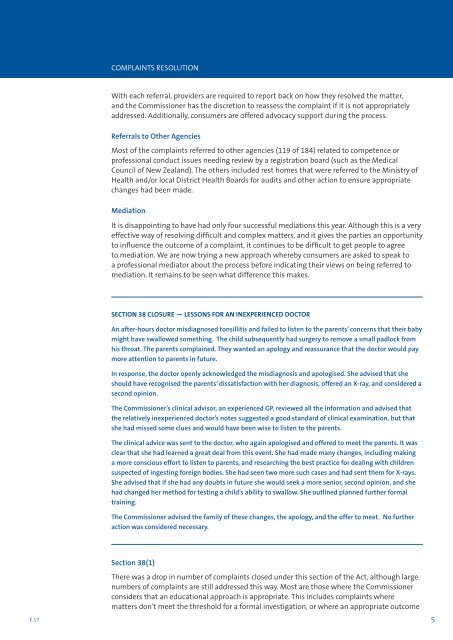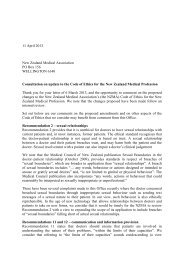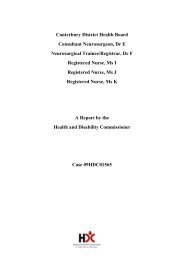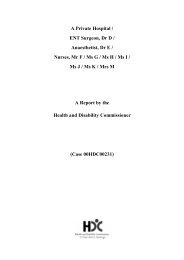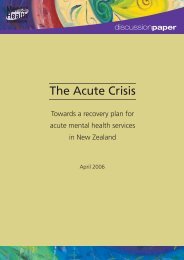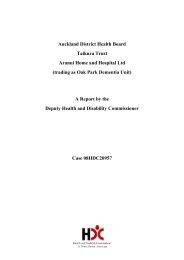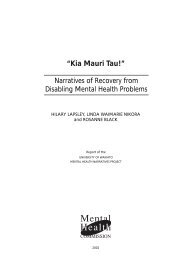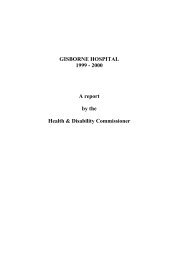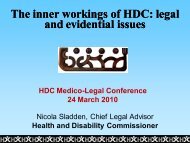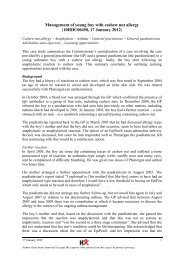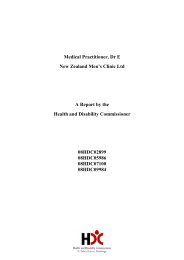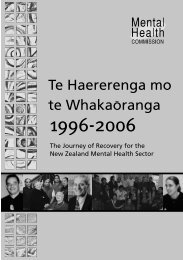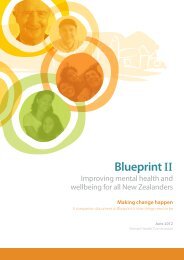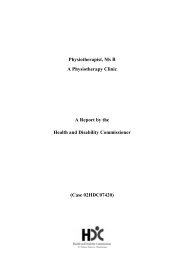Annual Report for the year ended 30 June 2009 - Health and ...
Annual Report for the year ended 30 June 2009 - Health and ...
Annual Report for the year ended 30 June 2009 - Health and ...
You also want an ePaper? Increase the reach of your titles
YUMPU automatically turns print PDFs into web optimized ePapers that Google loves.
COMPLAINTS RESOLUTION<br />
With each referral, providers are required to report back on how <strong>the</strong>y resolved <strong>the</strong> matter,<br />
<strong>and</strong> <strong>the</strong> Commissioner has <strong>the</strong> discretion to reassess <strong>the</strong> complaint if it is not appropriately<br />
addressed. Additionally, consumers are offered advocacy support during <strong>the</strong> process.<br />
Referrals to O<strong>the</strong>r Agencies<br />
Most of <strong>the</strong> complaints referred to o<strong>the</strong>r agencies (119 of 184) related to competence or<br />
professional conduct issues needing review by a registration board (such as <strong>the</strong> Medical<br />
Council of New Zeal<strong>and</strong>). The o<strong>the</strong>rs included rest homes that were referred to <strong>the</strong> Ministry of<br />
<strong>Health</strong> <strong>and</strong>/or local District <strong>Health</strong> Boards <strong>for</strong> audits <strong>and</strong> o<strong>the</strong>r action to ensure appropriate<br />
changes had been made.<br />
Mediation<br />
It is disappointing to have had only four successful mediations this <strong>year</strong>. Although this is a very<br />
effective way of resolving difficult <strong>and</strong> complex matters, <strong>and</strong> it gives <strong>the</strong> parties an opportunity<br />
to influence <strong>the</strong> outcome of a complaint, it continues to be difficult to get people to agree<br />
to mediation. We are now trying a new approach whereby consumers are asked to speak to<br />
a professional mediator about <strong>the</strong> process be<strong>for</strong>e indicating <strong>the</strong>ir views on being referred to<br />
mediation. It remains to be seen what difference this makes.<br />
SECTION 38 CLOSURE — LESSONS FOR AN INEXPERIENCED DOCTOR<br />
An after-hours doctor misdiagnosed tonsillitis <strong>and</strong> failed to listen to <strong>the</strong> parents’ concerns that <strong>the</strong>ir baby<br />
might have swallowed something. The child subsequently had surgery to remove a small padlock from<br />
his throat. The parents complained. They wanted an apology <strong>and</strong> reassurance that <strong>the</strong> doctor would pay<br />
more attention to parents in future.<br />
In response, <strong>the</strong> doctor openly acknowledged <strong>the</strong> misdiagnosis <strong>and</strong> apologised. She advised that she<br />
should have recognised <strong>the</strong> parents’ dissatisfaction with her diagnosis, offered an X-ray, <strong>and</strong> considered a<br />
second opinion.<br />
The Commissioner’s clinical advisor, an experienced GP, reviewed all <strong>the</strong> in<strong>for</strong>mation <strong>and</strong> advised that<br />
<strong>the</strong> relatively inexperienced doctor’s notes suggested a good st<strong>and</strong>ard of clinical examination, but that<br />
she had missed some clues <strong>and</strong> would have been wise to listen to <strong>the</strong> parents.<br />
The clinical advice was sent to <strong>the</strong> doctor, who again apologised <strong>and</strong> offered to meet <strong>the</strong> parents. It was<br />
clear that she had learned a great deal from this event. She had made many changes, including making<br />
a more conscious ef<strong>for</strong>t to listen to parents, <strong>and</strong> researching <strong>the</strong> best practice <strong>for</strong> dealing with children<br />
suspected of ingesting <strong>for</strong>eign bodies. She had seen two more such cases <strong>and</strong> had sent <strong>the</strong>m <strong>for</strong> X-rays.<br />
She advised that if she had any doubts in future she would seek a more senior, second opinion, <strong>and</strong> she<br />
had changed her method <strong>for</strong> testing a child’s ability to swallow. She outlined planned fur<strong>the</strong>r <strong>for</strong>mal<br />
training.<br />
The Commissioner advised <strong>the</strong> family of <strong>the</strong>se changes, <strong>the</strong> apology, <strong>and</strong> <strong>the</strong> offer to meet. No fur<strong>the</strong>r<br />
action was considered necessary.<br />
E.17<br />
Section 38(1)<br />
There was a drop in number of complaints closed under this section of <strong>the</strong> Act, although large<br />
numbers of complaints are still addressed this way. Most are those where <strong>the</strong> Commissioner<br />
considers that an educational approach is appropriate. This includes complaints where<br />
matters don’t meet <strong>the</strong> threshold <strong>for</strong> a <strong>for</strong>mal investigation, or where an appropriate outcome<br />
5


